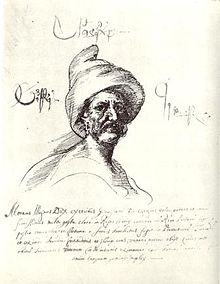Giorgi Saakadze
| Grand Mouravi Giorgi Saakadze |
|
|---|---|

Saakadze's portrait drawn by Teramo Castelli in Constantinople in 1626.
|
|
| Native name | გიორგი სააკაძე |
| Nickname(s) | Grand Mouravi |
| Born | c. 1570 Peli, Kingdom of Kartli |
| Died | October 3, 1629 Aleppo |
| Allegiance |
Kingdom of Kartli Kingdom of Kakheti Safavid Persia Ottoman Empire |
| Battles/wars |
Battle of Tashiskari Battle of Marabda Battle of Martqopi Battle of Bazaleti Ottoman–Safavid War (1623–39) |
Giorgi Saakadze the Grand Mouravi (Georgian: გიორგი სააკაძე) (c. 1570 – October 3, 1629) was a Georgian politician and military commander who played an important but contradictory role in the politics of the early 17th-century Georgia. He was also known as Grand Mouravi (დიდი მოურავი, didi mouravi) in Georgia, Mūrāv-Beg in Persia and Māūrāv-Hūn or Māġrāv-Bek in the Ottoman Empire for having served as a mouravi (appointed royal official which can be rendered by seneschal or bailiff) of Tbilisi.
Saakadze's family came of the untitled nobility (samepo aznauri). His father, Siaush, rose in prominence through a loyal service to King Simon I of Kartli, whom Giorgi joined in military service in his early career. Under the young king Luarsab II, he was appointed a mourav of Tbilisi, Tskhinvali, and Dvaleti in 1608. Saakadze’s influence and prestige especially grew after he destroyed an Ottoman invasion force at the battle of Tashiskari in June 1609, thereby saving Luarsab from being dislodged. In 1611, the king married Saakadze’s sister, Macrine, annoying the great nobles, who grew increasingly suspicious of the ambitious and aspiring officer who had had risen from the ranks of the petty nobility to become the most powerful man in Kartli. The animosity between the two nobles parties centered on the princes P’arsadan Tsitsishvili and Shadiman Baratashvili on one hand, and Saakadze on the other. The nobles convinced Luarsab that Saakadze was an Iranian traitor, prompting him to divorce Macrine and authorize a plot to kill him in May 1612. Saakadze escaped the trap and defected to Iran. Having converted to Islam and displayed his military ability in Iran’s war with the Ottomans, he quickly won the confidence of Shah Abbas I of Iran and was regularly consulted on the Georgian affairs.
...
Wikipedia
